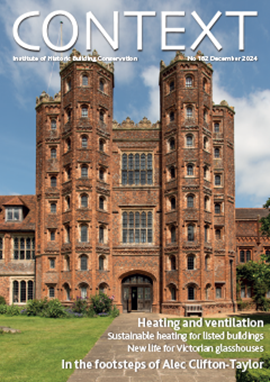IHBC signpost update from Lords Committee: support climate behaviour change
A report published by the Lords Environment and Climate Change Committee into behaviour change for climate and environmental goals warns that the Government’s current approach to enabling behaviour change is seriously inadequate.
image: Open Government Licence v3.0
Contents |
The Environment and Climate Change Committee writes:
The Environment and Climate Change Committee has published a report which warns that the Government’s current approach to enabling behaviour change is seriously inadequate and will result in the UK failing to meet its?net zero and environment targets…..
The Committee identified—drawing on the Committee on Climate Change’s assessment—that one third of greenhouse gas emissions reductions up to 2035 require decisions by individuals and households to adopt low carbon technologies and choose low-carbon products and services, as well as reduce carbon-intensive consumption.
The Committee found that while the Government has introduced some policies to help people adopt new technologies, like electric cars, that focus has not been replicated in other areas. The Committee concluded that there has been too great a reliance on as yet undeveloped technologies to get the UK to net zero?and a reluctance to help people cut carbon-intensive consumption.
During the inquiry the Committee heard from 146 organisations from across the UK and further afield including businesses, local authorities, charities and think tanks as well as government ministers, academics & researchers, and young people.
Chair’s comments
Baroness Parminter, Chair of the Environment and Climate Change Committee said:
“After a summer of record temperatures, fires and hose pipe bans, it has never been more apparent that the twin crises of climate change and nature loss demand an immediate and sustained response.
People power is critical to?reach our environmental goals, but?unless we are encouraged and enabled to change behaviours in how we travel, what we eat and buy and how we heat our homes, we won’t?meet those targets.?Polling shows the public is ready for leadership from the Government. People want to know how to play their part in tackling climate change and environmental damage.
The Government’s mantra of “going with the grain of consumer choice” demonstrates a reluctance to help people cut carbon-intensive consumption. It is in a unique position to guide the public in changing their behaviours, however their approach is inadequate in the face of the urgent scale of the environmental challenge.
The Prime Minister urgently needs to set out her vision of a country where low carbon choices and behaviours can flourish.”
Key recommendations
The Committee recommends that the Government should:
learn from examples of where it has enabled behaviour change, including during the COVID-19 pandemic, and enable people to make the necessary shifts in the key areas of how we travel,?what we eat, what we buy?and?how we use energy at home
launch a public engagement campaign to build support for helping people to adopt new technologies and reduce carbon-intensive consumption in the key areas where behaviour change is required
help the public to reduce carbon and resource-intensive consumption in diets, products, services and travel
use the Net Zero Forum, announced in October 2021, to address the coordination, resourcing and responsibilities between local and central government, recognising the key role of local authorities in helping enable behaviour change in local communities
use every lever the Government has–including regulations and fiscal incentives and disincentives–to address the barriers which prevent changing behaviours
place fairness at the heart of policy design and tailor behaviour change interventions to avoid placing a burden on those who can least afford it. For example, providing financing support for low-income households as part of a national drive to improve the energy efficiency of our homes.
Read more and download the report….
This article appears on the IHBC news and blog site as "IHBC signpost update from Lords Committee: Government must support behaviour change to meet climate targets" dated December 16, 2022
--Institute of Historic Building Conservation
Related articles on Designing Buildings
- Actuate UK issues climate warning and urges action.
- Performance gap in low energy housing.
- Energy targets for buildings.
- Collaborative practices for building design and construction.
- Climate Change Act.
- How can we help achieve net zero?
- Intergovernmental Panel on Climate Change IPCC.
- Government net zero review 2022.
IHBC NewsBlog
200th Anniversary Celebration of the Modern Railway Planned
The Stockton & Darlington Railway opened on September 27, 1825.
Competence Framework Launched for Sustainability in the Built Environment
The Construction Industry Council (CIC) and the Edge have jointly published the framework.
Historic England Launches Wellbeing Strategy for Heritage
Whether through visiting, volunteering, learning or creative practice, engaging with heritage can strengthen confidence, resilience, hope and social connections.
National Trust for Canada’s Review of 2024
Great Saves & Worst Losses Highlighted
IHBC's SelfStarter Website Undergoes Refresh
New updates and resources for emerging conservation professionals.
‘Behind the Scenes’ podcast on St. Pauls Cathedral Published
Experience the inside track on one of the world’s best known places of worship and visitor attractions.
National Audit Office (NAO) says Government building maintenance backlog is at least £49 billion
The public spending watchdog will need to consider the best way to manage its assets to bring property condition to a satisfactory level.
IHBC Publishes C182 focused on Heating and Ventilation
The latest issue of Context explores sustainable heating for listed buildings and more.
Notre-Dame Cathedral of Paris reopening: 7-8 December
The reopening is in time for Christmas 2025.
Stirling Prize-winning Salford building to be demolished
The Centenary Building will be bulldozed as part of the wider £2.5bn Crescent regeneration project.


















Comments
[edit] To make a comment about this article, click 'Add a comment' above. Separate your comments from any existing comments by inserting a horizontal line.